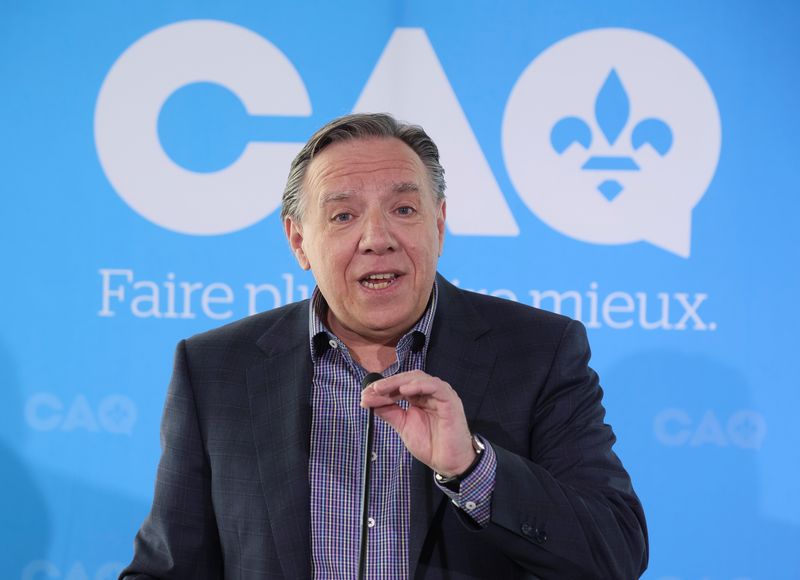After divisive campaign, Quebec’s Legault eyes unity in second term
2022.10.03 21:07
[ad_1]
2/2

© Reuters. FILE PHOTO: Quebec Premier Francois Legault speaks to the media following his closing speech at the CAQ national convention in Drummondville, Quebec, Canada May 29, 2022. REUTERS/Christinne Muschi/File Photo
2/2
By Allison Lampert
MONTREAL (Reuters) – Coalition Avenir Quebec leader Francois Legault, the former airline executive turned politician who is projected to win re-election as premier of Quebec, Canada has a new goal after running what experts called a “divisive” campaign: being a unifier.
The self-made businessman and co-founder of Montreal-based carrier Air Transat is poised to lead his party to re-election with a majority, following a campaign dotted with controversy over immigration and identity in the mostly French-language province.
CAQ was leading in 86 of the 111 seats for which CBC projections were available.
Legault, 65, a self-described pragmatist and nationalist, promised to continue capping immigration at 50,000 per year, even as businesses demanded more foreign workers in the face of labor shortages.
Legault has extended an olive branch to the province’s English-speaking minority in recent days and said he would work with a fractured opposition.
“I see a role for myself if I am elected Oct. 3 as premier which is to be a uniter,” Legault told reporters last week, speaking in French.
Analysts said Legault will likely adopt a more moderate tone as premier following campaign-trail comments linking immigration to extremism, and a warning that bringing in too many immigrants who did not speak French would be “suicidal.”
“He certainly wasn’t the leader in this campaign for all Quebecers,” said Jack Jedwab, president of the Association for Canadian Studies.
“He’s actually said some extremely divisive things, but I suspect he’ll probably be more moderate when he gets elected. He’ll have to.”
A French-speaker, Legault grew up in a mostly English-speaking Montreal suburb and has warned repeatedly of the vulnerability of French in North America.
An accountant, Legault has garnered support from largely older, French-speaking rural voters, especially on the CAQ’s handling of the economy where he targeted balanced budgets and lowering the wealth gap between Quebec and neighboring Ontario.
Legault, who was a minister for the separatist Parti Quebecois (PQ) government from 1998 to 2003, founded the CAQ in 2011 as a center-right party that would slash red tape, boost personal wealth and avoid wars with the rest of Canada over issues like separation.
His government faced challenges on a law that banned public employees from wearing religious symbols, along with new rules to protect French that were decried for impacting areas from court hearings to hiring.
Leger Marketing pollster Christian Bourque said CAQ’s rhetoric on immigration may have appealed to his older, French-speaking base; almost two out of three baby boomers are voting for the CAQ. But the CAQ will need to win younger voters over time to remain in power, he said.
“I think it’s the last time in Quebec history where you can speak about immigration in those words,” Bourque said.
[ad_2]
Source link








